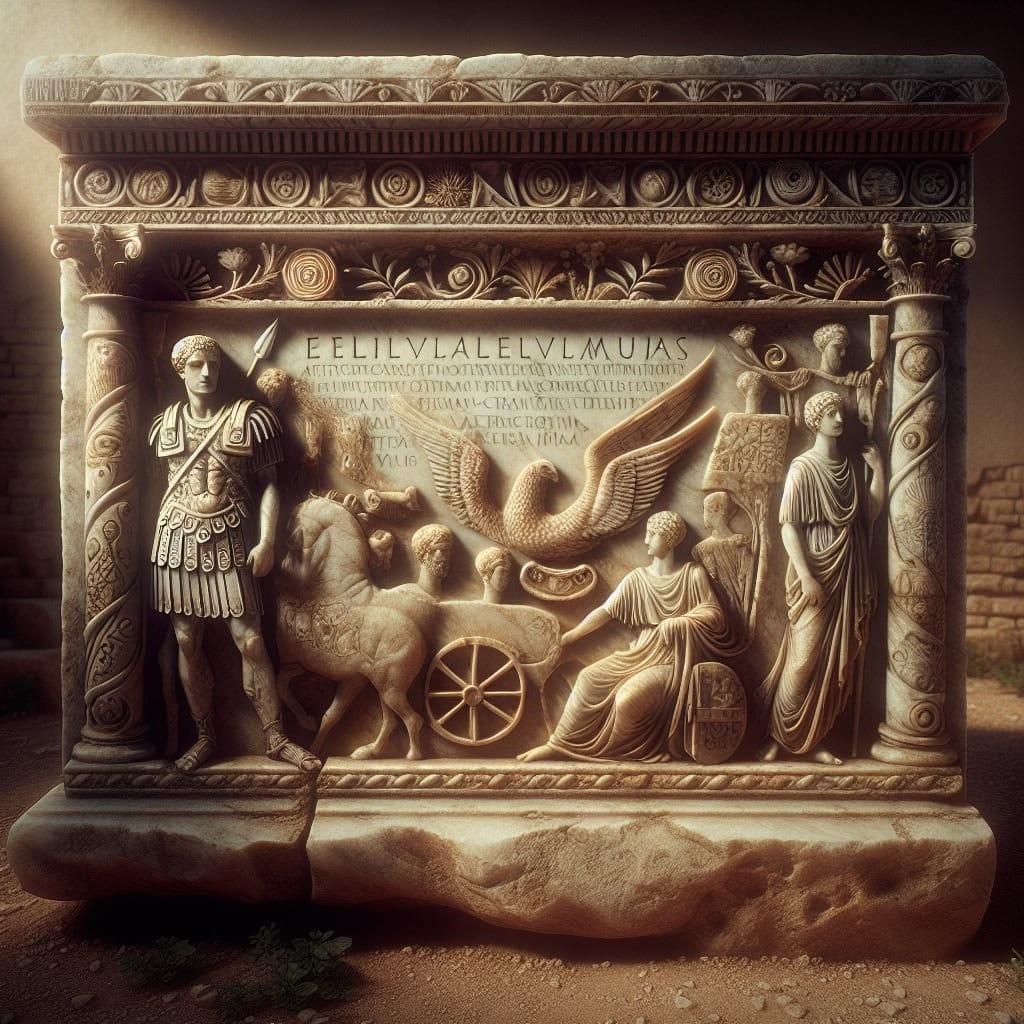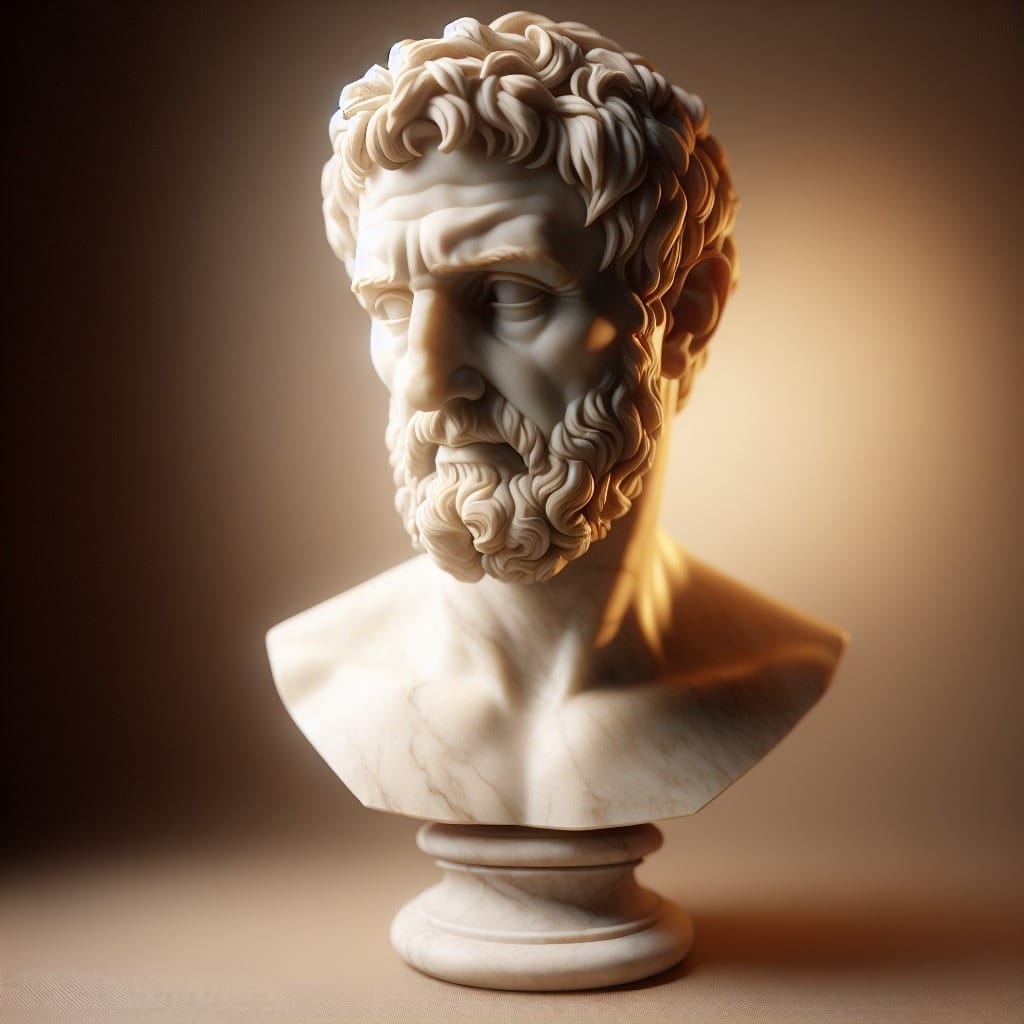Seneca, a prominent Roman philosopher and counselor to Emperor Nero, is renowned for his influential work, Letters to Lucilius. Written between 63 AD and 65 AD, these 124 letters were addressed to his friend Lucilius, the procurator of Sicily. They offer practical guidance on leading a Stoic life, focusing on inner strength and acceptance of life’s circumstances.
In ancient Rome, Stoicism was a key philosophical school, emphasizing virtues like wisdom, courage, and temperance. Seneca’s letters played a pivotal role in making Stoic philosophy accessible to a broader audience, providing insights into ethical living and personal development.
Today, Seneca’s teachings continue to resonate, offering timeless wisdom on finding contentment and living meaningfully amidst modern complexities. His ideas on detachment from material success, valuing time, and fostering inner strength remain highly relevant, guiding individuals in their pursuit of a fulfilled life.
Understanding Stoic Philosophy
Stoicism, a prominent school of thought in ancient Rome, is founded on several core principles that emphasize the pursuit of a virtuous life. At its heart is the idea of living according to nature, which involves acknowledging our place within the cosmos and acting in harmony with the natural order. This principle underscores the interconnectedness of all living beings.

Central to Stoicism is the pursuit of virtue. The four cardinal virtues—temperance, courage, justice, and practical wisdom—are seen as essential to achieving true happiness. Stoics believe that external possessions are insignificant in comparison to the cultivation of these virtues.
In Roman society, Stoic philosophy significantly influenced both personal conduct and public ethics. The emphasis on control of thoughts and actions encouraged Roman citizens to focus on what is within their power, fostering a sense of personal responsibility. Moreover, the elimination of toxic emotions such as fear and anger helped individuals navigate the complexities of Roman life with rationality and composure.
Thus, the integration of Stoic principles into Roman culture not only shaped individual behavior but also informed the broader moral framework of the society, guiding leaders and citizens alike in their daily lives.
Seneca on Emotional Control
In Seneca’s Letters to Lucilius, the philosopher underscores the importance of controlling emotions as a cornerstone of Stoic philosophy. He warns against becoming a slave to one’s emotions, particularly anger, which he views as a destructive vice. “We are more often frightened than hurt; and we suffer more in imagination than in reality,” Seneca writes, illustrating the need for rational control over emotional responses.

Recognize the Problematic Nature of Anger
Seneca advises acknowledging that anger is rarely beneficial and often leads to regrettable actions. By recognizing anger’s harmful nature, one can begin to manage it effectively.
Aim for a Tranquil Mind
Tranquility should be the ultimate goal. Seneca suggests that maintaining a peaceful mind helps in avoiding full-blown anger, allowing one to remain composed regardless of external circumstances.
Identify Anger Triggers
Mindfulness is key. By identifying the specific thoughts and patterns that incite anger, individuals can intervene early and prevent emotional escalation.
Through these techniques, Seneca offers timeless strategies for achieving emotional control, emphasizing the Stoic ideal of tranquility in the face of life’s challenges. His teachings remain relevant, providing guidance for those seeking inner peace in a tumultuous world.
Accepting Mortality
In his Letters to Lucilius, Seneca offers profound insights on the acceptance of death, a cornerstone of Stoic philosophy. He emphasizes that true courage manifests in accepting the inevitable, urging individuals to acknowledge the fleeting nature of life. Seneca argues that grief, if left unchecked, can become overwhelming, as demonstrated by the case of Marcia, who mourned her son for years. He contrasts this with Livia’s more balanced response, who honored her son’s memory without allowing grief to dominate her life.

This perspective aligns with the broader Stoic belief that one should accept what cannot be controlled, including mortality. This acceptance fosters tranquility and resilience, encouraging individuals to focus on living virtuously. By recognizing the inevitability of death, Stoics advocate for a life free from the fear of loss and anxiety about the future. This rational acceptance allows individuals to appreciate life more deeply and make the most of their time. Seneca’s teachings remind us that while life is fragile, it is also an opportunity to live fully in the present, preparing for the inevitable with grace.
Living Virtuously in Wealth and Power
In ancient Rome, individuals of wealth and power grappled with the challenge of maintaining virtue amidst their affluence. Seneca, a prominent figure in Roman society, understood the complexities faced by the elite. He addressed these issues in his Letters to Lucilius, offering guidance on balancing material wealth with moral integrity.

Seneca advised the Roman elites to practice self-awareness and humility, emphasizing that true wealth lies in the cultivation of virtue rather than material possessions. He cautioned against the corrupting influence of power, urging leaders to remain grounded in ethical principles. Through his letters, he encouraged a life of simplicity and integrity, advocating for the use of wealth as a means to support the greater good rather than personal indulgence.
By highlighting the transient nature of worldly possessions, Seneca urged his contemporaries to focus on inner growth and moral development. His teachings remain relevant today, inspiring those in positions of influence to strive for a life marked by virtue, regardless of their material circumstances.
Moral Dilemmas in Positions of Influence
During Seneca’s time, Roman leaders encountered moral complexities shaped by philosophical traditions like Stoicism and Epicureanism. These philosophies presented leaders with ethical challenges, such as prioritizing virtue over personal pleasures and ensuring the welfare of all citizens. The rise of Christian ethics further complicated the moral landscape, demanding a balance between legalistic codes and compassion.

Seneca, in his advisory role to Emperor Nero, offered actionable guidance for navigating these dilemmas. He emphasized moral integrity and self-control as the bedrock of ethical leadership. By advocating for simplicity and humility, he encouraged leaders to prioritize virtue over wealth.
| Ancient Dilemmas | Modern Dilemmas |
|---|---|
| Balancing power with virtue | Navigating ethical business practices |
| Wealth vs. the common good | Corporate social responsibility |
By examining the teachings of exemplars like Socrates, Seneca provided a framework for cultivating ethical integrity, which remains relevant for today’s leaders facing similar moral challenges.
Enduring Appeal of Seneca’s Wisdom
The wisdom imparted by Seneca in his Letters to Lucilius continues to resonate with modern readers due to its universal application. In today’s world, where material success often dictates self-worth, Seneca’s advocacy for detachment from material success remains particularly relevant. He encourages individuals to cherish virtues over wealth, a principle echoed by contemporary thinkers who emphasize authentic living.

Moreover, Seneca’s teachings on financial independence advocate for a balanced life, cautioning against the excessive pursuit of wealth. This perspective aligns well with the increasingly popular notion of minimalism and living within one’s means. His ideas about the impact on others also find resonance in modern values of empathy and community, urging individuals to seek happiness through positive contributions to society.
In an era dominated by digital distractions, Seneca’s assertion that time is our most valuable asset prompts reflection on how we allocate our time, fostering a more intentional lifestyle. As philosopher William Irvine notes, “Stoicism teaches us to focus on what we can control.” Such insights guide contemporary readers in navigating the complexities of modern life, offering a timeless framework for personal growth and well-being.
Practical Advice for Modern Life
Seneca’s timeless wisdom offers guidance for integrating Stoic principles into contemporary life. His teachings encourage individuals to navigate modern complexities with resilience and clarity. Here are some practical tips inspired by Seneca:
- Detach from Material Success: Prioritize character over wealth. Embrace the idea that self-worth is not tied to material possessions.
- Practice Financial Independence: Live within your means. Balance financial goals with personal well-being to avoid the pitfalls of consumerism.
- Value Your Time: Recognize that time is your most valuable asset. Engage in meaningful activities and avoid trivial pursuits.
- Focus on the Inner World: Cultivate personal philosophy. Seek fulfillment from within, rather than from external validation.
- Embrace Contentment: Appreciate what you have. Practice mindfulness and gratitude to foster mental well-being.

As Seneca wisely observed, “True happiness comes from contributing positively to the lives of others.” By applying these principles, individuals can cultivate a purposeful and resilient life that aligns with their core values.
FAQ on Seneca and Stoicism
Seneca’s philosophy and Stoicism often raise intriguing questions. Below, we address some common inquiries:
What is the essence of Seneca’s philosophy?
Seneca’s teachings revolve around the importance of living virtuously, detaching from material wealth, and valuing time. He encourages individuals to focus on personal growth and inner fulfillment over external validation.
How does Stoicism address emotional control?
Stoicism teaches the importance of mastering emotions by cultivating rational thinking and self-awareness. Techniques such as reframing negative thoughts, akin to modern Cognitive Behavioral Therapy, are used to maintain composure in challenging situations.
Can Stoic principles be applied to modern life?
Absolutely. Modern Stoicism emphasizes practical applications like effective altruism and mental fortitude. These principles help individuals navigate contemporary challenges by promoting resilience and purposeful living.
Why is Seneca’s wisdom still relevant today?
Seneca’s insights on financial independence, empathy, and contentment resonate with today’s societal values. His teachings on valuing time and focusing on one’s inner world provide timeless guidance amidst modern distractions.
Summarizing Seneca’s Teachings
Seneca’s letters encapsulate enduring themes of detachment from material success, financial independence, and the value of time. These teachings emphasize the importance of inner virtues over external wealth, encouraging individuals to find contentment and meaning beyond societal expectations.
Seneca also underscores the significance of empathy and community, suggesting that true fulfillment arises from positively impacting others’ lives. This aligns with contemporary values of social responsibility and mindfulness. In today’s fast-paced world, his wisdom offers a framework for prioritizing personal growth and well-being.
Moreover, Stoic principles guide us in cultivating resilience and clarity, as discussed in modern Stoicism. By integrating these teachings into our lives, we can address contemporary challenges with purpose and intentionality, making Seneca’s insights as relevant now as in ancient Rome.
Seneca’s Legacy
Seneca’s profound impact on philosophy extends far beyond the confines of ancient Rome, influencing a myriad of thinkers across the centuries. His writings, particularly in Stoic wisdom, laid the groundwork for subsequent philosophical explorations into the nature of virtue, ethics, and the human condition. Notably, Seneca’s emphasis on emotional resilience and moral clarity resonated with later philosophers, including the likes of René Descartes and Immanuel Kant, who drew from Stoic principles in their own inquiries.

Moreover, Seneca played a pivotal role in ensuring the continuity of Stoic thought, bridging the gap between classical Stoicism and its modern iterations. His teachings on the importance of inner virtues over external wealth and the cultivation of a personal philosophy have inspired countless individuals to adopt a Stoic mindset, even in today’s complex world. Through his letters, Seneca not only addressed the ethical dilemmas of his time but also provided timeless insights that continue to guide those seeking a life of purpose and integrity.
As a result, Seneca’s legacy endures, offering a beacon of wisdom for future generations striving to navigate the challenges of both their personal and external worlds.
Seneca in Literature and Media
Seneca’s influence permeates both literature and modern media, offering a rich tapestry of insights that continue to captivate audiences. In literature, Seneca’s work has been a source of inspiration for many writers, including Dante Alighieri, who referenced Seneca’s insights in The Divine Comedy. The moral and ethical dilemmas explored in Seneca’s letters resonate with themes of virtue and integrity, often mirrored in the works of William Shakespeare, who drew from Stoic philosophy to enrich his own character portrayals.

In modern media, Seneca’s teachings find a foothold in various adaptations and interpretations. His emphasis on detachment from material success and mental fortitude is often echoed in contemporary films and television series that explore the complexities of human experience and the pursuit of a meaningful life. Documentaries and podcasts dedicated to Stoicism frequently draw on Seneca’s wisdom, showcasing its relevance in today’s fast-paced world.
Overall, Seneca’s enduring presence in literature and media underscores the timeless nature of his teachings, offering guidance to those navigating the moral complexities of both historical and modern contexts.
Embracing Stoicism Today
Incorporating Stoic philosophy into modern life offers a pathway to resilience and clarity. A practical starting point is to focus on self-awareness, identifying one’s core values and what truly matters. This introspection helps individuals prioritize meaningful pursuits like family health and happiness, fostering a grounded sense of purpose.

Seneca’s teachings also emphasize detachment from material success. In a world often obsessed with wealth, embracing financial independence and living within one’s means can lead to a balanced and fulfilling life. This approach not only curtails stress but also allows for a deeper appreciation of non-material joys.
Furthermore, integrating Stoic practices such as mindfulness and gratitude encourages a focus on the present. By valuing time as one’s most precious asset, individuals are urged to engage in activities that bring true satisfaction, avoiding the pitfalls of trivial pursuits.
Ultimately, embracing Stoicism today offers enduring benefits. Through mental fortitude and effective altruism, one can navigate life’s complexities with grace, contributing positively to society while nurturing personal well-being and contentment.
Conclusion
As we draw upon the wisdom embedded in Seneca’s letters, it becomes evident how his teachings transcend time, offering profound insights for navigating the complexities of both ancient and modern life. His emphasis on virtues over material success, the value of time, and the importance of inner fulfillment resonate deeply today.
Seneca’s philosophy invites us to reflect on our own lives, urging a separation of self-worth from financial status and cultivating a mindset of gratitude and mindfulness. Embracing these Stoic principles can lead to a more balanced, meaningful existence.
For those inspired by Seneca’s wisdom, further exploration of modern Stoicism provides a practical framework to integrate these timeless teachings into everyday life. As we strive for personal growth and resilience, Seneca’s insights remain a powerful guide on our journey toward living virtuously.

